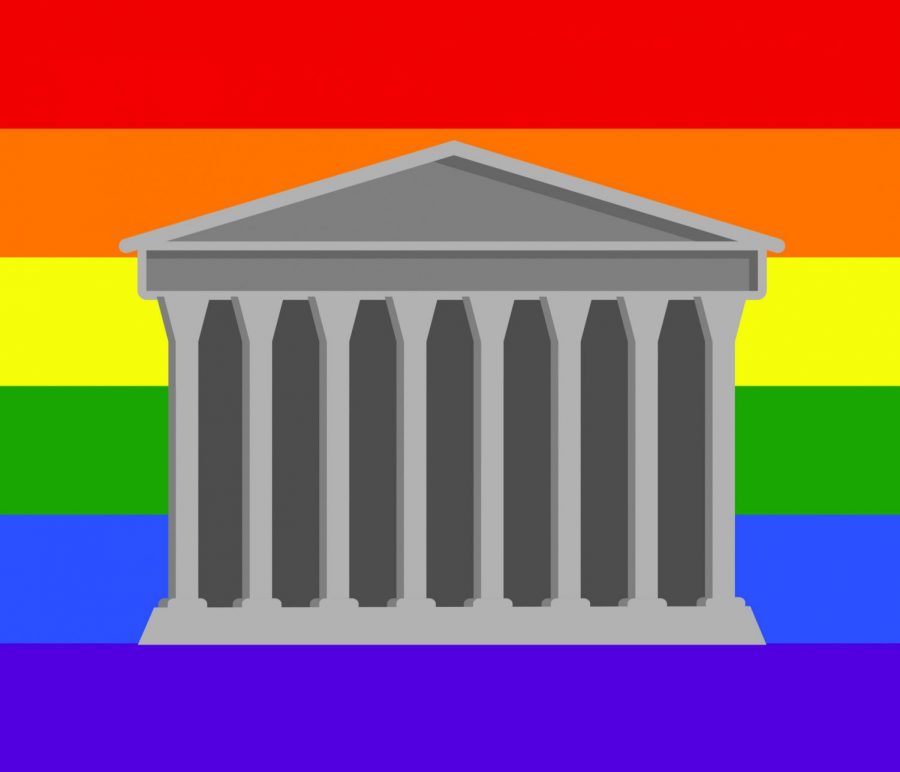The Case That Will Change LGBTQ+ Rights Forever
HARRIS FUNERAL HOMES VS. AIMEE STEPHENS The Supreme Court case that got so much press will change LGBTQ+ Community rights forever.
November 8, 2019
The court case of Harris Funeral Homes vs. Aimee Stephens was regarding Aimee Stephens, who was fired from her job because, she says, her boss disapproved of the fact that she is transgender. The results of the case could possibly mean new laws regarding the LGBTQ community.
Stephens says she was terminated from Harris Funeral home by its owner, Thomas Rost, shortly after she informed Rost that she intended to transition from male to female and would represent herself and dress as so while at work.
After her employment was terminated, Stephens filed a complaint with the Equal Employment Opportunity Commission (EEOC), which investigated Stephens’s allegations that she had been terminated as a result of unlawful sex discrimination. She also filed the following charges against the funeral home: terminating Stephens’s employment on the basis of her transgender and transitioning status and her refusal to conform to sex-based stereotypes; and administering a discriminatory-clothing-allowance policy. Stephens’s also claims that “the only explanation” she received from “management” for her termination was that “the public would not be accepting of [her] transition.” She further noted that throughout her “entire employment” at the Funeral Home, there were “no other female Funeral Director/Embalmers.” However, during the investigation, the EEOC learned from another employee that the Funeral home did not provide its public-facing female employees with suits or a clothing stipend.
The district court granted summary judgment in favor of the Funeral home on both claims. According to the The Courts Transcript “We hold that the Funeral home engaged in unlawful discrimination against Stephens on the basis of her sex; the Funeral home has not established that applying against sex discrimination to the Funeral home would substantially burden Rost’s religious exercise, and therefore the Funeral home is not entitled to a defense under RFRA; even if Rost’s religious exercise were substantially burdened, the EEOC has established that is the least restrictive means of furthering the government’s compelling interest in eradicating workplace discrimination against Stephens. The EEOC may bring a discriminatory-clothing-allowance claim in this case because such an investigation into the Funeral Home’s clothing-allowance policy was reasonably expected to grow out of the original charge of sex discrimination that Stephens submitted to the EEOC.”
In the investigation, the EEOC learned that the Funeral home provided its male employees with clothing that was in the company’s dress code. Aimee Stephens’s attorney said therefore he put a “reverse the district court’s grant of summary judgment on both the unlawful-termination and discriminatory-clothing-allowance claims, grant summary judgment to the EEOC on its unlawful-termination claim, and remand he case to the district court for further proceedings consistent with this opinion.”
Freshman Samantha Carver said, “Some people feel, if a biological women dressed like a woman it’d be fine, but a transgender woman, who is a woman, dresses like one then all of a sudden there’s a problem. [This] really represents transphobia.” She also said that “people are people. The same rights you’d give to a straight white guy, you should give to everyone else.”
This case had brought a tremendous amount of attention to the LGBTQ community due to the fact the it could change discrimination rights for everyone. Times Newspaper in an article states, “Such a ruling would be disastrous, relegating LGBTQ people around the country to a second-class citizen status. The LGBTQ community has fought too long and too hard to go back now, and we are counting on the justices not to reverse that hard-won progress.”
What might not be known is this case brought so much controversy about the ruling that on Friday the Trump administration filled a brief that is asking the Supreme Court to essentially legalize anti-gay discrimination in the workplace. The brief, from Solicitor General Noel Francisco (who is the Solicitor General of the United States) argues, “Federal prohibitions on employer discrimination do not extend to protect individuals from being fired or otherwise disenfranchised in the workplace because of their sexual orientation.”
Agreeing with General Noel, the Justice Department argued that, “Unfavorable treatment of a gay or lesbian employee as such is not the consequence of that individual’s sex, but instead of an employer’s policy concerning a different trait—sexual orientation—that Title VII does not protect.”





